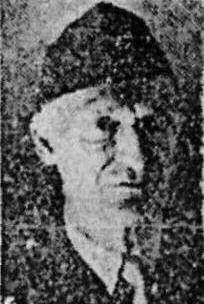|
A Hill Where Two Infantry Regiments The Boston Daily Globe |
|
Not a Thing to Show They Had Anything to Eat and Practically Every Canteen Found There Was Empty
by Caylyle Holt, Globe Staff War
Correspondent
Across the valley, narrow alley, Is a pine-clad hill. On the brow of the hill standing white against the dark trees is a religious group centering around a giant crucifix. These are religious people and such wayside shrines and spots are common. This one looks down the valley over Schonberg and along the bloody road to St. Vith, where the tide of battle ebbed and flowed during the recent great battle.
‘That hill, in those woods, said Col Brown, “is where the two infantry
regiments made their last stand and where the remnants finally
surrendered. ‘“I
have been all over that ground. Of course I had a more personal interest
than most because my brother-in-law, Lt Col Joseph F. Puett, also of
Eastman, commanded a battalion of the 423d
1nfantry and I hoped to find out what happened to him. He is
reported missing in action,” said the Col, "but I did find some of his
personal correspondence and the rubber stamp he used as a battalion
commander so I know be must have been on that hill. “I have been through all the records of the bodies recovered in this territory and I personally looked over the bodies that we found on the hill after the snow melted and he was not among them so I think that he is probably a prisoner. The towns people here say that something more than 1,000 men were marched away to Germany after the regiments surrendered.”
“That wooded hill with its torn and splintered pines Is called Linscheid Hill. It is on the southeastern outskirts of Schonberg and overlooks the town. From it the soldiers of the cornered American units could see the road winding down the valley toward St. Vith, their only route of escape, firmly held by the Germans. I had already seen the litter of rent and twisted jeeps and trucks, burned out tanks and scattered helmets, belts, and other discarded and lost personal equipment on that road and others In the region.
“I
kept my brother-ln-law's rubber stamp,” said Col Brown and I am going to
have a swell time kidding him when the war is over. I will make him sweat
to get that stamp back."
“At first the
ground was covered with snow. The whole area was
sprinkled with personal equipment of all kinds. Now down here,”
(pointing to
a spot southeast of the hill) "is where artillery gave up. I
don't know
how they did It but they did a wonderful job of blowing up their
guns, believe me. The Krauts did not get one gun that was useful. Every single gun was blown up. Most of the tubes were burst and in some cases the breech blocks were blown oft too, and that takes something. I think they must have rammed a shell into the muzzle, and then fired the gun. Anyway they did a wonderful job and every gun was useless.
"Funny thing about this litter that was all over the place, these fellows had some ammunition left, not much but just enough to keep fighting, then going a few days longer. But we did not find anywhere on the bill any kind of ration and that is extraordinary. There was not an empty can or ration box or anything to show that they had anything to eat. And another peculiar thing was that practically every canteen he found was empty or held only an inch or two of water. So I think It was not ammunition that made them surrender but lack of food."
Later In the day I
heard the story of a major general who came to Linscheid hill looking for
his son. The general tramped all over the hill and looked over
the bodies. He went through all the. records. But he did not find his son
until he was
about to
leave. As
he walked
down to the hill toward his car, his party came upon the body of 2d
Lieutenant face down In the mud. When they turned the body over the
general found his son. |
| Page last revised 12/01/2005 |
 I
c
I
c